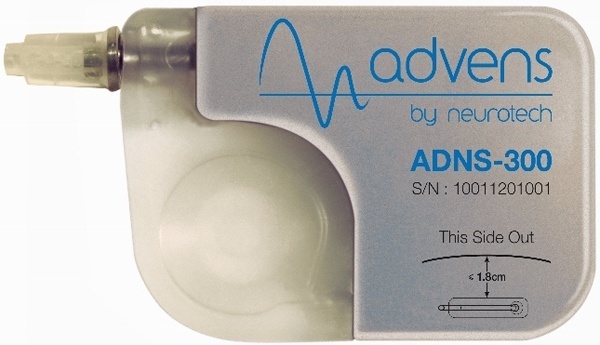
In June 2012 Neurotech s.a. (http://www.neurotech-int.eu), a Belgium based developer and manufacturer of neurostimulation devices, obtained the CE Mark for its ADNS-300 system for the treatment of refractory epilepsy. According to the press release:
“Advens therapy” uses the ADNS-300 stimulator as a therapeutic option for those patients who are refractory to anti-epileptic drugs and are not eligible for epilepsy (brain) surgery. The ADNS-300 is the world’s first rechargeable neurostimulator for vagus nerve stimulation. The device includes an innovative electrode and a promising “sensing” feature that may prove to be a significant technological breakthrough in the control of response to the therapy. Patients use a remote controller and charger to turn the system on/off and to recharge the neurostimulator. “Rechargeable systems may prove to be more cost-effective, especially if surgical operations to replace batteries are avoided over time. This helps patients to maintain a more independent life, with a lower risk of potential complications associated with battery replacement surgery.” ‘The role of Rechargeable Systems in Neuromodulation Paul Eldridge et al.’
“We are pleased to have reached this key milestone in the development of our range of our proprietary products and we are looking forward to make this therapy available to all the eligible patients of key European centers of excellence,” said Mr. Michel Troosters, CEO of Neurotech s.a. “We are convinced that this unique, state-of-the-art medical device will prove to be an important tool in the care for patients suffering from refractory epilepsy. The sensing feature, once clinically validated, could represent a paradigm shift in the VNS field,” added Mr. Troosters. Early clinical testing of the device and its different features have shown promising results (El Tahry R, Raedt R, Mollet L et al, A novel implantable vagus nerve stimulation system (ADNS-300) for combined stimulation and recording of the vagus nerve. Epilepsy Res 2010;92:231-9)
The prevalence of active epilepsy is roughly in the range of 5-10 per 1.000 people according to the World Health Organization. Approximately 1/3 of epileptic patients are considered “refractory” and thus potential candidate for the Advens therapy.
“The commercial outlook of Neurotech is very attractive in Europe with diversified applications in the product pipeline. We are now ready to open the capital of the company to new investors who will position Neurotech as the world-class neuromodulation company,” according to Mr. Philippe Durieux, CEO of Sopartec and board member of Neurotech. The market launch of this new product is scheduled with a gradual roll-out to most European countries.
About Neurotech s.a. and the Advens therapy to stimulate the vagus nerve:
Neurotech s.a. is a spin-off of the Université Catholique de Louvain (http://www.uclouvain.be ) and has been funded by SOPARTEC (http://www.sopartec.com), VIVES ( http://www.vivesfund.com) and SRIW (http://www.sriw.be).
Neurotech ADNS-300, its first commercial product, presents two key differentiators: the ADNS-300 uses a rechargeable battery and the device does not only stimulate the nerve but also records neural activity from the left vagus nerve using an innovative cuff electrode. This unique sensing feature enables the physician to capture the “compound action potential” (CAP) generated by the stimulation, which should allow an improved and personalized treatment.
Update 6/20/2013:
Peter Bergsma, Program Manager VNS-HF (formerly VP Neurotech) asked me to please update this post with the following information: “In the mean time Neurotech has been acquired by the Sorin Group and their VNS technology will be applied for treating heart failure.”
